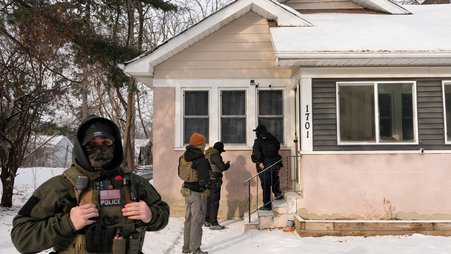I sat at a table with the senior warden of my prison. He was livid that I had written a disturbing essay for The Marshall Project about mentally ill prisoners in solitary confinement. He threatened to fire me from the prison newspaper staff, with bogus disciplinary cases, as well as to force a prison transfer.
My editor took me out into the adjoining hallway for a heart-to-heart chat. “You can't write negative things about the prison,” he warned me. Those double barbed wire perimeter fences that surround this place are there not to keep prisoners in, he added, but to keep the general public out.
That chat completely transformed my entire journalistic perspective — before the warden completely transformed my prison life. My editor instilled within me a better understanding of the importance of my journalistic voice and how steep of a price I would have to pay if I elected to provide the general public with access to daily prison occurrences.
With publication, comes retaliation
That meeting was years ago. Since then, I’ve published a few more essays, and I have been subjected to a range of retaliation by prison staff. The administration has written bogus disciplinary infractions against me numerous times, including when I wrote a letter to the editor of a local newspaper, The Huntsville Item, praising a former warden who placed a high priority on treating prison employees and prisoners equally.
My personal property, including my manual typewriter, have been arbitrarily confiscated and never returned in retaliation for articles written for local human rights organizations that criticized ineffective prison practices. After my participation in an ABC News story highlighting the prison agency’s failed COVID-19 policies, I was tossed into solitary confinement for 23 months. Recently, a group of rogue prison guards showed up unceremoniously to my cell and viciously assaulted me with chemical agents as a result of my continuous coverage of a mass hunger strike by prisoners held in solitary confinement.
Since prisoners are not rendered much in regard to autonomy and worldly possessions, the thought of losing what little you have to mean-spirited and unforgiving prison officials is enough to discourage any prisoner from speaking truth to power.
My story — just like the countless other acts of intimidation and retaliation tactics that incarcerated journalists throughout the country are subjected to by prison officials — will probably not end up in your news feed. But these retaliatory practices are relentless in our nation's jails and prisons.
Incarcerated journalists do not have newsroom support and are oftentimes left to fend for themselves after reporting on inhumane conditions and corrupt practices. A combination of prison officials' unchecked autonomy on what information leaves the prison and the failure of the journalist community to erect institutions to protect their incarcerated colleagues, have contributed significantly to the routine targets and attacks.
Emerging awareness, support
The issue has been getting more attention. A recent article in Shadowproof about the retaliation against incarcerated journalists outlines an array of difficult hurdles that incarcerated writers face on a daily basis, with little to no free-world assistance or legal protections. Prison Policy Initiative also published a report detailing the ways prisons suppress journalism from the inside.
And there are organizations that have emerged to support journalists inside prison walls. Empowerment Avenue facilitates and supports incarcerated journalist/outside journalist partnerships to establish frameworks that remove barriers incarcerated journalists face and to hold systems accountable.
PEN America created its Prison Writing Program in 1971, after the infamous Attica prison riots, to empower incarcerated writers. In 2022, it released the book, “The Sentences That Create Us.” In it, current and former incarcerated writers highlighted the significance of the incarcerated writer to the profession of journalism, as well as the myriad of cruel tactics that prison administrators have utilized to suppress their voices.
For example, Thomas Whitaker, an incarcerated writer in Texas, wrote about how incarcerated writers have an obligation to report on prison conditions because no one else will. Whitaker warns the incarcerated writer should expect prison administrators to completely "mess up your life." In addition to attracting negative attention from wardens, he wrote that an incarcerated writer should expect to be written bogus disciplinary cases, subjected to countless unnecessary and senseless cell searches, and to prolonged stays in solitary confinement.
Since prisoners are not rendered much in regard to autonomy and worldly possessions, the thought of losing what little you have to mean-spirited and unforgiving prison officials is enough to discourage any prisoner from speaking truth to power. Replacing necessary material like expensive typewriters, and grammar and resource guides, along with having all your outgoing/incoming mail and visits highly censored, makes it extremely difficult to write quality articles.
How to help the incarcerated journalist
We need even more institutions like PEN America's Prison Writing Program to assist and protect their incarcerated fellow writers. I’ve seen the positive impact of this work firsthand. With The Marshall Project, we documented the inedible, non-nutritious food the prison was serving during the COVID-19 pandemic. After the story published, prison officials in Texas completely transformed the food-service operations and introduced more wholesome hot meals that included fresh fruit and real, instead of powdered, milk.
I often receive correspondence from journalists who have read my work. They want to know what could be done to help my journalism career. My response is simple: Advocate for the inclusion of incarcerated writers in your newsroom and writer’s groups; volunteer for progressive organizations like PEN America or Empowerment Avenue; mentor an incarcerated writer; and assist and report on their First Amendment freedom of speech violations with the same intensity that you would your free-world colleagues.
The incarcerated voice is paramount in the world of journalism. Without it, the world in general is left with a significant information void — what transpires behind the double razor wire fence that surrounds each prison.
Jeremy Busby is a writer and activist incarcerated in Texas. He is currently seeking assistance with a civil rights lawsuit against Texas prison officials for numerous violations of his First and Eighth amendment rights in retaliation for his journalism. The lawsuit is pending in the U.S. District Court for the Northern District of Texas, Wichita Falls Division, Civil Action No. 7:23-cv-024-O. He is a former staff writer for the Texas Prison Newspaper and can be reached directly through the Securus eMessaging system, Jeremy Busby #00881193 Texas.





